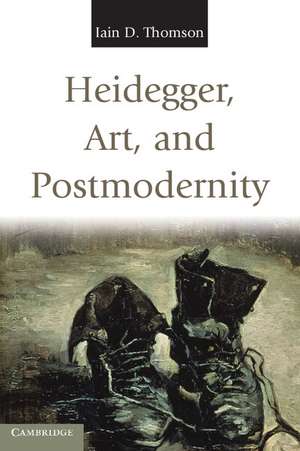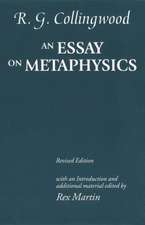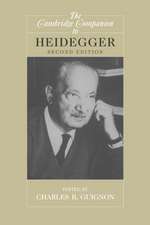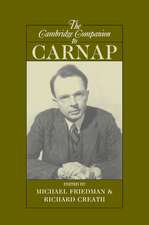Heidegger, Art, and Postmodernity
Autor Iain D. Thomsonen Limba Engleză Paperback – 28 apr 2011
| Toate formatele și edițiile | Preț | Express |
|---|---|---|
| Paperback (1) | 203.50 lei 6-8 săpt. | |
| Cambridge University Press – 28 apr 2011 | 203.50 lei 6-8 săpt. | |
| Hardback (1) | 553.80 lei 6-8 săpt. | |
| Cambridge University Press – 28 apr 2011 | 553.80 lei 6-8 săpt. |
Preț: 203.50 lei
Nou
Puncte Express: 305
Preț estimativ în valută:
38.94€ • 40.66$ • 32.23£
38.94€ • 40.66$ • 32.23£
Carte tipărită la comandă
Livrare economică 04-18 aprilie
Preluare comenzi: 021 569.72.76
Specificații
ISBN-13: 9780521172493
ISBN-10: 0521172497
Pagini: 266
Ilustrații: 6 b/w illus.
Dimensiuni: 152 x 226 x 15 mm
Greutate: 0.36 kg
Editura: Cambridge University Press
Colecția Cambridge University Press
Locul publicării:New York, United States
ISBN-10: 0521172497
Pagini: 266
Ilustrații: 6 b/w illus.
Dimensiuni: 152 x 226 x 15 mm
Greutate: 0.36 kg
Editura: Cambridge University Press
Colecția Cambridge University Press
Locul publicării:New York, United States
Cuprins
Introduction: Heidegger, art, and postmodernity; 1. Understanding ontotheology, or 'the history that we are'; 2. Heidegger's critique of modern aesthetics; 3. Heidegger's postmodern understanding of art; 4. 'Even better than the real thing'? Postmodernity, the triumph of simulacra, and U2; 5. Deconstructing the hero: the postmodern comic book; 6. The philosophical fugue: understanding the structure and goal of Heidegger's Contributions to Philosophy (From Enowning); 7. The danger and the promise of Heidegger, an American perspective; 8. Against conclusions.
Recenzii
'Heidegger, Art, and Postmodernity is a fascinating, engaging, and deeply insightful book that will have a revolutionary impact on the understanding of Heidegger's later thought, as well as make important contributions to our understanding of postmodernism, not just in philosophy, but in culture studies more broadly. Thomson's central thesis is that Heidegger's later thought is animated by the development of a distinctively postmodern sensibility. The sense in which his thought is postmodern, however, does not conform to the standard conceptions of postmodernism regnant in current literature. Rather, Heidegger's postmodernism lies in his sense that the late modern technologized epoch in which we live hides within itself the possibility of 'another god', a paradigm shift that takes us beyond the modern into a future we cannot yet envision.' William Blattner, Georgetown University
'Iain Thomson has a real knack for getting Heidegger to speak to contemporary concerns. Against the background of Thomson's pathbreaking interpretation of Heidegger's idea of 'ontotheology', the essays in this volume illuminate a sense of 'postmodernity' that responds to the nihilism of modernity's technological paradigm without falling into nostalgia for a single meaning of being. The resulting pluralism is adroitly explored through examples from high art and popular culture in ways that make Heidegger's difficult late works come alive.' Steven Crowell, Rice University
'I learned a lot from Iain Thomson's book. He has a masterful grasp of the diverse art forms he discusses and he writes about even the most obscure thinkers with verve and clarity. One can trust his critical evaluations, especially his appreciation of the ontological pluralism that stands at the center of Heidegger's hope for a postmodern understanding of being.' Hubert L. Dreyfus, University of California, Berkeley
'… excellent … Thomson's explanations of Heidegger's difficult later works are unfailingly clear, carefully laying out the arguments and explaining all technical terms. Furthermore, the book's organization guides the reader so smoothly through the steps of his discussion that it should make knee-jerk objections about Heideggerian obscurantism much harder to make … After reading his book, I now see some of Heidegger's ideas and writings in a new light … By inspiring and drawing out new ideas, Iain Thomson's book takes its rightful place along with Julian Young's excellent Heidegger's Philosophy of Art as an important piece of scholarship on this topic. In keeping with its own precepts, it does not definitively settle Heidegger's views on this topic once and for all but, like a work of art, opens up new questions and pathways for thought.' Lee Braver, Notre Dame Philosophical Reviews
'Iain Thomson's Heidegger, Art, and Postmodernity is an exceptional piece of Heidegger scholarship, providing detailed, informative analysis while remaining highly readable … [It] is filled with compelling insights not only about Heidegger, but also about the nature of art, modernity, and humanity's hopes for the future. Thomson has remarked that when one speaks of ontotheology or postmodernity philosophers tend to look for the door. This excellent book will surely change that.' Irene McMullin, Journal of the History of Philosophy
'… [Thomson] is a teacher, deeply concerned to impart, passionate about the subject, infectiously fascinating … This book is a circumspect, analytical, often profoundly critical, examination of the key role that art plays in Heidegger's philosophy. [It] convincingly demonstrates, in the most critically efficient terms, that it is not possible for the theoretical discourse of contemporary aesthetics to assimilate Heidegger without disturbing that discourse to its core. Thomson's alternative Heideggerian proposal is that art (more accurately, the 'ontological epiphany' that art elicits) provides one particularly powerful vehicle of awakening for this alternative mode of thinking; for art has the capacity to stimulate the kind of meditative thinking capable of transcending the dominant metaphysical infrastructure of late-modern cognition.' Kieran Cashell, Journal of Critical Realism
'Iain Thomson has a real knack for getting Heidegger to speak to contemporary concerns. Against the background of Thomson's pathbreaking interpretation of Heidegger's idea of 'ontotheology', the essays in this volume illuminate a sense of 'postmodernity' that responds to the nihilism of modernity's technological paradigm without falling into nostalgia for a single meaning of being. The resulting pluralism is adroitly explored through examples from high art and popular culture in ways that make Heidegger's difficult late works come alive.' Steven Crowell, Rice University
'I learned a lot from Iain Thomson's book. He has a masterful grasp of the diverse art forms he discusses and he writes about even the most obscure thinkers with verve and clarity. One can trust his critical evaluations, especially his appreciation of the ontological pluralism that stands at the center of Heidegger's hope for a postmodern understanding of being.' Hubert L. Dreyfus, University of California, Berkeley
'… excellent … Thomson's explanations of Heidegger's difficult later works are unfailingly clear, carefully laying out the arguments and explaining all technical terms. Furthermore, the book's organization guides the reader so smoothly through the steps of his discussion that it should make knee-jerk objections about Heideggerian obscurantism much harder to make … After reading his book, I now see some of Heidegger's ideas and writings in a new light … By inspiring and drawing out new ideas, Iain Thomson's book takes its rightful place along with Julian Young's excellent Heidegger's Philosophy of Art as an important piece of scholarship on this topic. In keeping with its own precepts, it does not definitively settle Heidegger's views on this topic once and for all but, like a work of art, opens up new questions and pathways for thought.' Lee Braver, Notre Dame Philosophical Reviews
'Iain Thomson's Heidegger, Art, and Postmodernity is an exceptional piece of Heidegger scholarship, providing detailed, informative analysis while remaining highly readable … [It] is filled with compelling insights not only about Heidegger, but also about the nature of art, modernity, and humanity's hopes for the future. Thomson has remarked that when one speaks of ontotheology or postmodernity philosophers tend to look for the door. This excellent book will surely change that.' Irene McMullin, Journal of the History of Philosophy
'… [Thomson] is a teacher, deeply concerned to impart, passionate about the subject, infectiously fascinating … This book is a circumspect, analytical, often profoundly critical, examination of the key role that art plays in Heidegger's philosophy. [It] convincingly demonstrates, in the most critically efficient terms, that it is not possible for the theoretical discourse of contemporary aesthetics to assimilate Heidegger without disturbing that discourse to its core. Thomson's alternative Heideggerian proposal is that art (more accurately, the 'ontological epiphany' that art elicits) provides one particularly powerful vehicle of awakening for this alternative mode of thinking; for art has the capacity to stimulate the kind of meditative thinking capable of transcending the dominant metaphysical infrastructure of late-modern cognition.' Kieran Cashell, Journal of Critical Realism
Notă biografică
Descriere
Develops Heidegger's argument that art can help lead society beyond the nihilism of the modern age.
















